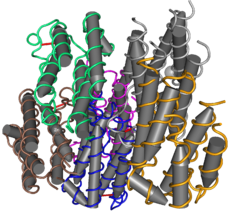
The molecular structure of human interferon-alpha
Interferons (IFNs) are proteins released by body cells in response to pathogens such as viruses, bacteria, parasites or to tumor cells. They allow cells to trigger the defenses of the immune system.
IFNs belong to the large class of glycoproteins known as cytokines. Interferons are named after their ability to "interfere" with virus replication inside host cells.
IFNs also have other functions:
- they activate immune cells, such as natural killer cells and macrophages;
- they increase recognition of infection or tumor cells by up-regulating antigen presentation to T lymphocytes;
- they increase the ability of uninfected host cells to resist new infection by virus. Certain symptoms, such as aching muscles and fever, are related to the production of IFNs during infection.
